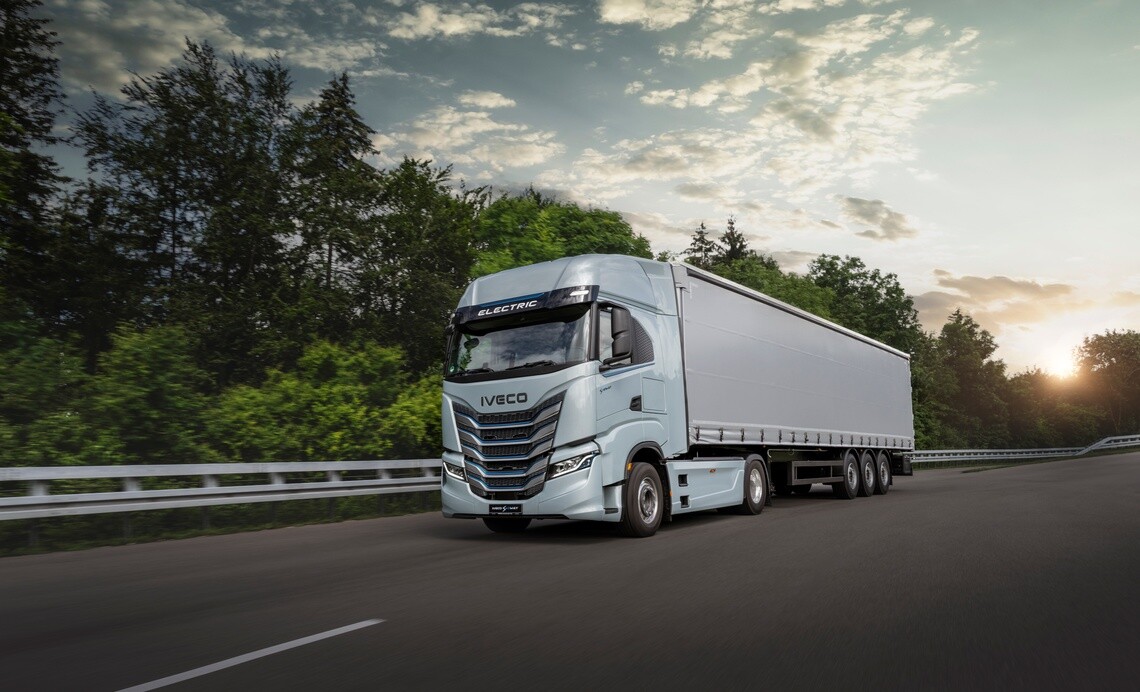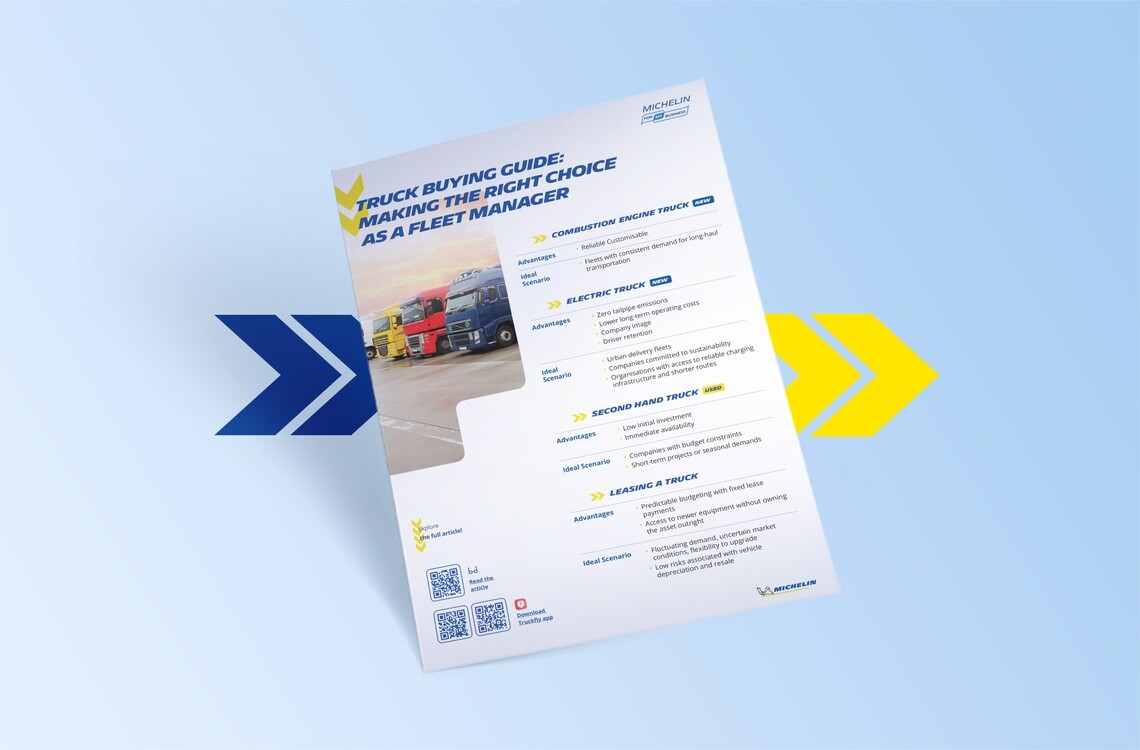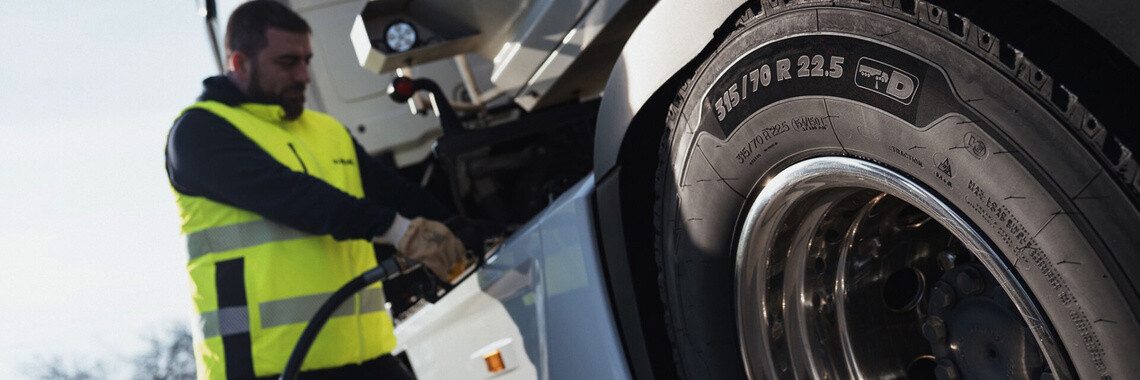
header buying a new truck
Truck, Freight transportation
If we had to guess, we’d put environmental responsibility and economic pressure as the top two concerns of fleet owners today. On one hand, there’s a significant push ౼ from within your company or from your customers ౼ to decarbonise your fleet. On the other hand, potential costs and concerns over electric truck infrastructure may create a significant hurdle. When it comes time to replace a truck, what’s a fleet owner to do?
To stay competitive, fleet owners will need to rethink how they specify the optimum heavy duty vehicles, exploring alternative solutions and potentially adopting a mix of traditional and cleaner technologies. For our truck buying guide, we sat down with Clément Chandon, Alternative Propulsion Manager at IVECO1, to find out how different decisions can impact cost, sustainability and operational efficiency when buying a truck.

clément chandon alternative propulsion manager at iveco
Clément Chandon, Alternative Propulsion Manager at IVECO
Buying a diesel truck: The current standard for long-haul fleets
The majority of heavy-duty fleets and commercial vehicles rely on combustion engines such as diesel ౼ in particular, long-distance trucks and those carrying heavy loads. For these fleets, fuel costs remain a top concern. In response, when they buy a truck, cost-conscious fleet owners are increasingly turning to customisation to maximise efficiency. By tailoring vehicles to their specific needs, companies can achieve significant fuel savings. For example, low rolling resistance tyres can improve fuel economy by up to 4-5%2. Other options include smart gearboxes that automatically shut off the engine when idling, and aerodynamic tweaks like lower truck heights. All these advancements contribute to a greener and more sustainable future for traditional fleets.
While combustion engines remain a mainstay for many fleets, the industry is looking ahead to a lower-carbon future. Forward-thinking companies are exploring a wider range of energy sources when they buy a truck. These can include biodiesel and biomethane, including renewable-compress natural gas (also called bioCNG) or renewable-liquified natural gas (also called bioLNG), alongside even more advanced options like battery electric and hydrogen power.
Buying a new electric truck: Optimise your urban delivery fleets

buying a new electric truck for a greener future
A truck buying guide wouldn’t be complete without considering an EV ! Afterall, the transport industry is shifting gears towards a cleaner future, with electric trucks gaining traction. Last-mile delivery companies are pioneering this shift. Their smaller, lighter electric vehicles are perfectly suited for urban environments, and environmentally conscious customers are willing to pay a premium price for these eco-friendly deliveries.
Electric trucks generate zero tailpipe emissions and thus a significantly smaller carbon footprint. But the benefits extend beyond the environment. It enhances a fleet’s image as environmentally conscious, potentially attracting new customers and talent. So, are electric trucks viable? Light electric trucks can actually improve your bottom line. They yield lower long-term operating costs due to cheaper electricity compared to fuel and can even lead to potential government incentives and tax breaks for adopting green technology.
When compared to an ICE vehicle, the total cost of ownership (TCO) is typically lower for smaller heavy-duty and urban electric trucks, but generally higher for larger long-distance heavy-duty electric trucks. Variations in TCO are due to the local cost of energy, road toll and public incentives. As the technology develops and becomes increasingly adopted, TCO will likely improve as well.3
Some drivers also prefer the quiet engine of an electric truck, addressing a major pain point for employee satisfaction and retention. They also take pride in being part of their company's commitment to a greener future and are astonished by the dynamic performances of the vehicle, when accelerating or braking.
This shift however is not without its challenges ౼ for example the availability of charging infrastructure, the upfront cost of vehicles and the limited range in comparison to a diesel engine. As the technology continues to develop and the infrastructure is expanded, electric trucks are likely to become a more attractive option for a wider range of fleets and missions. Ready for a test drive?
Used truck buying guide: should you go for a second-hand truck?
Expanding your fleet doesn't have to mean starting from scratch! Which is why our truck buying guide includes second-hand trucks. Depending on their use case, fleet managers should consider the advantages of adding pre-owned trucks. It's a particularly smart choice for companies with lower annual mileage. Since these fleets generally experience less wear and tear, if you are looking for a used truck for sale you can save money compared to a new vehicle. Second-hand trucks are a great option if you are looking to cut costs or have an urgent need. They're often readily available for purchase at reduced prices, allowing you to quickly add to your fleet and meet pressing demands.
Truck leasing: the flexible option for fleets
If you’re considering leasing a truck, you should know that there are several types of leases available.
- • Operating lease: You pay a monthly fee and have the option to purchase the truck at the end of the lease term.
- • Financial lease: Same as a credit lease, without the option to purchase.
- • Full-service contract hire: You pay a monthly fee that includes all maintenance and repair costs.
- • Short-term rental: This is typically used to help fleets meet short term demand, including seasonal peaks and most notably in the construction sector.
- • Long-term rental: This can be used for a variety of purposes, such as fleet vehicles or backup trucks.
Leasing has some very concrete benefits. It allows fleets to avoid the upfront cost incurred when they buy a truck, simplifies the process of quickly adding or removing trucks from a fleet and eliminates the cost of depreciation. As the market develops, so too do the top trends. Today, we’re seeing more EV trucks available for lease, which eases the upfront investment for fleets in transition. Fleet managers can also opt for flexible plans with fees that vary based on how much they use the truck.
The truck leasing market is expected to grow in the coming years. This is due to a number of factors, including the rising cost of trucks, the need for more flexible solutions, and the growing popularity of EV trucks. In an effort to adapt to the changing needs of their customers, leasing companies will expand investment in new technology, such as telematics and data analytics, which allows companies to better manage their fleets and provide more value-added services to their customers.
Top takeaways from our truck buying guide
As the industry continues its energy transformation journey, fleets need a variety of options to succeed. For example, given the relatively small reach of the existing charging grid for EV trucks, many companies will opt for a mixed energy fleet. We recommend that fleet managers clearly communicate their needs, challenges, and goals. Most importantly fleet managers need to keep an open mind, align vehicle choice with long-term implications and listen to what is happening with manufacturers. Technologies and strategies are rapidly evolving so keep an eye out for even more flexible options in the future such as fleet sharing and retrofitting.

Pickup buying guide with expert tips to help you choose the right truck for your fleet
FAQs
The right choice depends on your operational needs! Fleet managers should carefully review all available options and consider key points such as payload, fuel efficiency, maintenance costs, and total cost of ownership. A well-informed decision starts with aligning these factors to your fleet’s specific usage.
The best way to buy a used truck is to purchase from a trusted source, such as an OEM offering certified vehicles with quality guarantees. This ensures the truck has passed technical inspections, meets safety standards, and includes reliable tyres — all of which reduce risk and unexpected costs. If buying uncertified, a thorough check of technical, usage, and tyre condition is essential.
In the context of trucks, the numbers 1500, 2500, and 3500 refer to different classes of pickup trucks, primarily used in North America, and they indicate the payload capacity of the vehicle. These classifications are more traditional than literal (they don’t correspond exactly to the weight in tons anymore), but they remain a common way to differentiate truck capabilities.
1. Interview conducted by Michelin with Clément Chandon, Alternative Propulsion Manager at IVECO - June 2024.
2. 5.6% reduction in fuel consumption: an internal Michelin study carried out in Ladoux (France) in May 2021, under the supervision of DEKRA, comparing new MICHELIN X® LINE ENERGY™ Z2 and D2 315/70 R 22.5 tyres with the same regrooved tyres (R 5 mm). Results may vary in real-use conditions and according to weather conditions, road type, tyre size and driving style.
3. IVECO Group Marchés et Tendances. Évolution TCO. Page 18. May 2024

gettyimages 930571046
car going fast on a road by night







